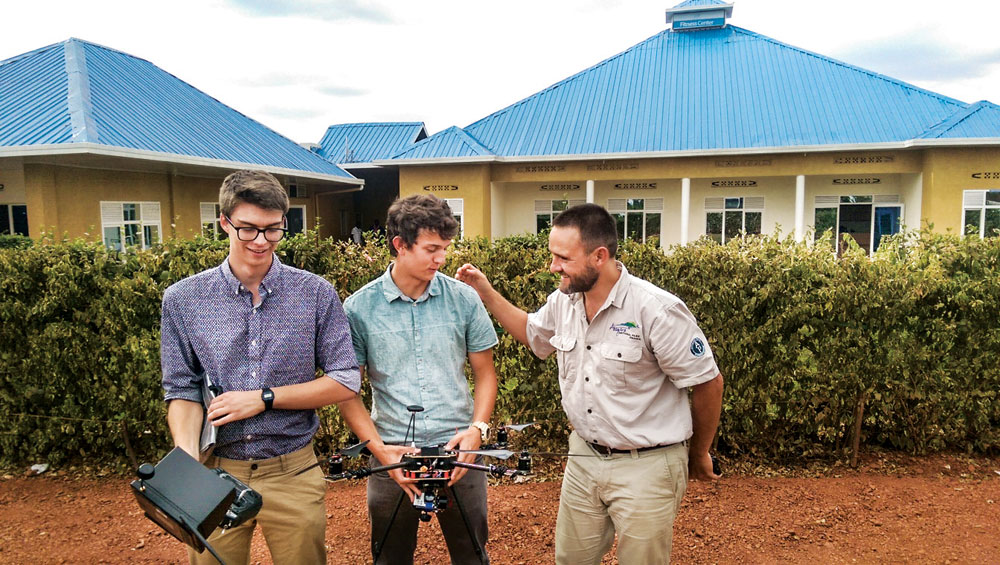
Nathan Lepore (left) and DSST classmate Max Alger-Meyer are pictured with a park ranger in Rwanda. Lepore and Alger-Meyer taught the rangers how to use and maintain the drone they invented and donated. Photo courtesy of Nathan Lepore
“It was an incredible experience,” said recent DSST graduate and Stapleton resident Nathan Lepore after returning from his recent trip to Rwanda. “It made me feel like a part of the global community.”
The aspiring engineer traveled to Africa with his former DSST classmate and fellow drone-designer Max Alger-Meyer and a small group of rising DSST seniors to donate an unmanned aircraft to employees of the Akagera National Park. While in Rwanda, Lepore and Alger-Meyer trained park rangers how to use their craft, which assists in the monitoring and tracking of lions, elephants, leopards and rare birds at the wildlife refuge.
“They picked up the construction of our drone really quickly,” he says. “The flying part was trickier, but we also brought over a smaller practice one that they used to get the hang of it. By the end, they had it.”
Lepore and the group from DSST flew to Kigali, the capital of Rwanda, from Denver in June. Their flight path took them to Washington, D.C., and then to Brussels before finally landing in Africa. Once there, it took the group two days to get clearance for their crafts though the Rwandan Aviation Authority. He explains that their drone, which was originally inspired when Alger-Meyer visited the 1,200-square-kilometer Akagera park last summer, was first conceived to help combat poaching in the preserve. But after more reflection he and Alger-Meyer decided that a drone could also work for overall animal monitoring and population counts.
“It was really cool for me as an American who leads a different kind of life, to take my ideas and partner with the people there to generate change,” he says. “As the technology for drones expands people are seeing that there are some very green uses for them, including conservation.”
Lepore says every four years the park rents a helicopter to conduct population counts for its animals, but that the drone can do the task more easily and for less money.
“It might not entirely replace the helicopter, as it can only stay up for about 30 minutes. But with the help of its camera it’s definitely useful for monitoring areas like the swamp that the rangers can’t walk through and also the large savanna areas. If the drone goes down in the swamp and gets fully submerged that’s not good. But most of the electronic components aren’t that expensive and can be replaced and the rest of it is very durable.”
Lepore and company visited a few schools while there and also spent some time in nearby Uganda. “Some people there think that all Americans are rich and are there just to help them in a financial way. We were asked not give money to local kids, so as not to perpetuate that kind of thinking.
The places we stayed were receptive and very welcoming. Akagera is similar to a US national park in that people pay to go in and visit. The prince of Belgium first dedicated the park strictly for conservation when Rwanda was still a colony. In the late ’90s, after the Rwandan genocide, it started to become a tourist oriented site and efforts were put in place to take better care of it and increase tourism.
The majority of its visitors are local. Even though they live in a country where big game animals are indigenous, many of them have never seen any. It’s nice to be a part of helping them to learn more about the park and to realize its importance in their lives.”
Lepore is headed to Olin College of Engineering in Massachusetts, where he also plans to study business and entrepreneurship.



0 Comments